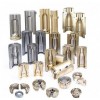AMETEK Land, working in partnership with furnace monitoring system manufacturer SVA Industrie Fernseh (SVA), has developed a new housing and pneumatic auto-retraction system for AMETEK Land’s renowned NIR-B (Near Infrared Borescope) Glass thermal imaging solution for glass furnace applications.
This development means that AMETEK Land’s award-winning NIR-B Glass thermal imager is further protected against damage from overheating within a glass production environment, especially in cases of air purge, water cooling or power failure.
Mark Bennett, Glass Industry Lead at AMETEK Land said: “We approached SVA as we were aware of the company’s expertise in pneumatic technology for high temperature environments.
“This latest innovation takes NIR-B Glass to the next level, offering major benefits to glass producers in terms of better asset protection and enhanced lifespan for the equipment.”
Axel Jürgens, Managing Director at SVA said: “With over 40 years’ experience in developing solutions for high-temperature industries, such as glass production, we were very happy to work in partnership with AMETEK Land on this project.
“This latest innovation makes NIR-B Glass the most-advanced thermal imaging solution for the glass industry on the market.”
The pneumatic auto-retract system consists of an innovative and rapid-response retraction mechanism, which instantaneously retracts the instrument from the furnace wall in the event of failure. The system will retract from a number of failures, such as air purge, water cooling, and mains power, and, if there is an over-temperature condition detected, at the borescope tip.
The system is fully pneumatic and has no exposed electrical components operating within the extremely high-temperature environment of the glass melt-tank. The system’s IP66-rated control box can be positioned up to 20 metres away and houses an uninterruptable power supply, which in the event of a power failure can automatically retract the NIR-B Glass.
Within the harsh process environment of the glass furnace, an integrated air purge ensures that the thermal imager maintains a clean lens at all times. With a high-performance water cooling system built-in as standard, the overall system has a low air flow requirement, even in the highest temperature furnaces.
NIR-B Glass, which was launched in 2016, enables glass producers to receive continuous real-time temperature data, combined with a crystal clear thermal video image. This means operators can clearly “see” cold spots from air leaks coming through structural refractory, so that cracks or collapses are easily detected. This, combined with the ability to visualise flames, allows the plant to optimise the flame pattern and burn efficiency. The ability to overlay thermal profiles across the crown and along the melt allows for accurate batch line control, production throughput optimisation, and batch transit time recording.
Designed specifically for the glass-melt furnace working environment, the NIR-B Glass is designed to withstand the high ambient temperatures. With over 324,000 temperature measurement points in the field of view, the NIR-B Glass also can monitor the drift in crown roof thermocouples.
Advanced software features allow multiple visual or output alarm controls to be set as specified by the plant. Critical areas, like port arches, can be continuously monitored for overheating, with automated alarms set for over-temperature conditions. This can be vital in extending the lifespan of the melt tank refractory and in providing greater asset protection through more accurate, remote infrared temperature measurement and live thermal imaging.
AMETEK Land is a business unit of AMETEK, Inc., a leading global manufacturer of electronic instruments and electromechanical devices. AMETEK Land designs and manufactures a wide range of instruments for industrial non-contact temperature measurement, combustion efficiency and environmental monitoring.
SVA Industrie Fernseh develops and produces furnace monitoring systems for use in high-temperature environments within the glass, steel, cement and waste industries, to improve processes, minimize waste and reduce environmental impact.







